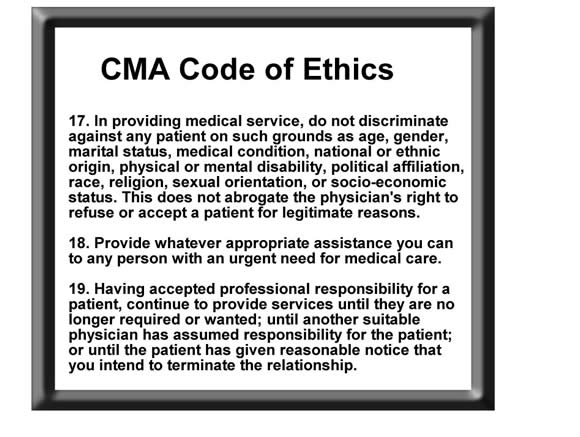Doctor-Patient Relationship
Contractual
The early basis for physician liability was contractual. The offer was the patient's request for treatment and acceptance was the doctor's care.
Most actions (law suits) against doctors have been based on negligence for the past century or so and from this arose the idea of duty in the doctor patient relationship. This duty of care exists independently of any contract between the doctor and patient.
Over the past 10 to 20 years there has been increasing emphasis on the fiduciary nature of the doctor-patient relationship.
Fiduciary
This means that doctors have an obligation to their patients to act in the utmost good faith and loyalty and must never allow their personal interests to conflict with their professional duty.
A fiduciary duty:
- The highest of duties one could owe to another.
- One party should only act in the best interests of another.
- Arises in a situation where is an imbalance of power or knowledge.
- Concept arose in the field of trusts.
A breach of a fiduciary duty would be in itself an injury and in court there would be no need to demonstrate causation of any other injury.
The fiduciary nature of the doctor-patient relationship has been held to be the foundation of the doctor's duty of confidentiality.
Doctors have been held liable for a breach in fiduciary duty in cases involving sexual abuse, patient exploitation and consensual sex with a patient.
Beginnings and Endings
The Canadian Medical Association Code of Ethics has these recommendations to make about initiating and dissolving a Patient-Physician Relationship:
Duty of care begins when a HCP agrees to treat a patient who has requested medical care.
It does not matter if the HCP has received any payment or not for his/her services.
Once the doctor has started to treat the patient, he is obliged to continue to attend the patient for as long as "good medical practice requires."
The doctor has a right to decide who they are willing to accept as a patient.
- Possible exception of some emergency cases
- Patient refusal is subject to anti-discrimination and human rights legislation
The patient may dismiss the doctor at any time.
- When this is done against medical advice (for example a patient taking his own discharge) the doctor or doctor's covering their practice has to take reasonable steps to inform the patient about the risks of doing so.
If a doctor decides to terminate a relationship with a patient, he/she should be very careful to avoid any allegation of abandonment
- The doctor should give the patient reasonable notice (for example by writing a letter to the patient explaining the situation and allowing time for the patient to get other medical assistance).


